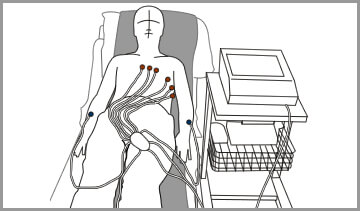What is an electrocardiogram?
An electrocardiogram (EKG Testing), or ecg test is a painless test done to record the heart’s electrical activity. This test is done in our Beverly Hills office, and takes anywhere between 5-10 minutes to perform. The electrocardiogram will show the doctor how fast your heart is beating, if your heartbeat is steady or irregular, if there exists an underlying heart condition, and the strength and timing of the electrical signal as they pass through each part of your heart.



